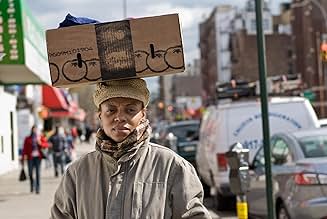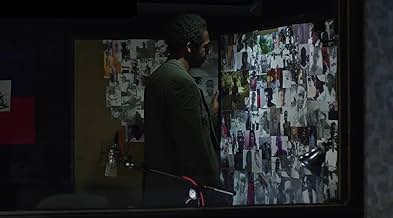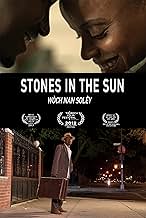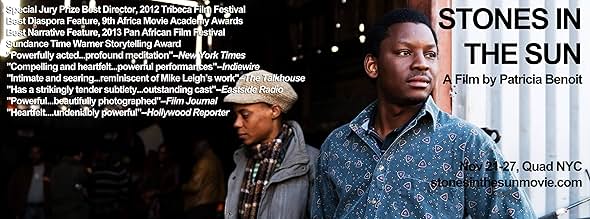अपनी भाषा में प्लॉट जोड़ेंIn the midst of increasing political violence, a young couple, two sisters, and a father and son are driven from Haiti to New York, where they must confront the truths of their interlocked p... सभी पढ़ेंIn the midst of increasing political violence, a young couple, two sisters, and a father and son are driven from Haiti to New York, where they must confront the truths of their interlocked pasts.In the midst of increasing political violence, a young couple, two sisters, and a father and son are driven from Haiti to New York, where they must confront the truths of their interlocked pasts.
- पुरस्कार
- कुल 2 जीत
फ़ीचर्ड समीक्षाएं
The film provides a beautiful character study of families in turmoil due to the refugee experience. Although it focuses on Haiti, and accurately portrays the diversity in politics that has marked and marred Haiti over the past three decades, it has universal application to all refugees and migrants forced to flee their countries and adapt to another culture without leaving their own culture or politics. The acting is superb and the directing by Patirica Benoit is even better. For someone who knows about Haiti or cares about the human experience of migrants and refugees this film is a gem. I would highly recommend it to anyone who appreciates an intricate and richly written and produced film.
STONES IN THE SUN directed by Haitian filmmaker Patricia Benoit focusing on the struggling lives of Haitian immigrants in Brooklyn, NY who had fled the torture and repressive reigns of Papa Doc Duvalier and Baby Doc Duvalier, his generals and the Tontons Macoutes/death squads in the 1980's.
"Duvalier authorized the Tontons Macoutes to commit systematic violence and human rights abuses to suppress political opposition. They were responsible for unknown numbers of murders and rapes in Haiti. He included among his opponents those who proposed progressive social systems. Political opponents often disappeared overnight, or were sometimes attacked in broad daylight. Tontons Macoutes stoned and burned people alive. Many times they put the corpses of their victims on display, often hung in trees for everyone to see and take as warnings against opposition " (Wikipedia.)
STONES IN THE SUN makes clear that we can leave our land but the land remains steadfast in our hearts; memories are seared into the ex-patriates' consciousness; the scars and beauty of the homeland weaves them to their past forever.
Benoit concentrates on 3 families to give a fuller dimension to the diaspora. I was particularly moved by a married couple, achingly played by Patricia Rhinvil as the wife Vita and her husband Ronald (James Noel,) a cabdriver who was forced to flee for demonstrating in Haiti, leaving his wife behind at the mercy of men in the dark who commit bestiality upon women's flesh. The history of sexual brutality is wreaked upon Vita's slight frame. She arrives at the Airport, shyly observing her husband with sideways looks - fear, love and apprehension flicker across her face; beautifully acted; words are superfluous. Glimpses of a more care- free time are cut into the frames - what might have been - and what was, and what is.
Haitian proverb: "Stones in the water don't know the suffering of stones in the sun."
"Duvalier authorized the Tontons Macoutes to commit systematic violence and human rights abuses to suppress political opposition. They were responsible for unknown numbers of murders and rapes in Haiti. He included among his opponents those who proposed progressive social systems. Political opponents often disappeared overnight, or were sometimes attacked in broad daylight. Tontons Macoutes stoned and burned people alive. Many times they put the corpses of their victims on display, often hung in trees for everyone to see and take as warnings against opposition " (Wikipedia.)
STONES IN THE SUN makes clear that we can leave our land but the land remains steadfast in our hearts; memories are seared into the ex-patriates' consciousness; the scars and beauty of the homeland weaves them to their past forever.
Benoit concentrates on 3 families to give a fuller dimension to the diaspora. I was particularly moved by a married couple, achingly played by Patricia Rhinvil as the wife Vita and her husband Ronald (James Noel,) a cabdriver who was forced to flee for demonstrating in Haiti, leaving his wife behind at the mercy of men in the dark who commit bestiality upon women's flesh. The history of sexual brutality is wreaked upon Vita's slight frame. She arrives at the Airport, shyly observing her husband with sideways looks - fear, love and apprehension flicker across her face; beautifully acted; words are superfluous. Glimpses of a more care- free time are cut into the frames - what might have been - and what was, and what is.
Haitian proverb: "Stones in the water don't know the suffering of stones in the sun."
A beautifully told story, full of poignancy, intrigue, drama, and even suspense. The film tells the story of three different sets of Haitian immigrants living in New York City, as they struggle to come to grips with their current environment, while still living in the shadow of their recent past. Though the film derives much of its power from the uniqueness and specificity of its setting, the themes are nonetheless universal, or nearly so. The director shows a deep understanding and empathy for the characters and their predicament, and it is a pleasure to see characters who are neither condescended to, nor needlessly flattered. The acting is naturalistic and moving.
क्या आपको पता है
- ट्रिवियाWinner - best narrative film, Pan African Film Festival, L.A , 2013.
टॉप पसंद
रेटिंग देने के लिए साइन-इन करें और वैयक्तिकृत सुझावों के लिए वॉचलिस्ट करें
विवरण
- रिलीज़ की तारीख़
- कंट्री ऑफ़ ओरिजिन
- भाषाएं
- इस रूप में भी जाना जाता है
- Ayiti, Ayiti
- फ़िल्माने की जगहें
- उत्पादन कंपनियां
- IMDbPro पर और कंपनी क्रेडिट देखें
- चलने की अवधि1 घंटा 35 मिनट
- रंग
इस पेज में योगदान दें
किसी बदलाव का सुझाव दें या अनुपलब्ध कॉन्टेंट जोड़ें









